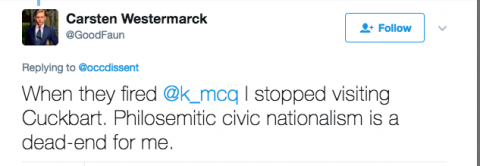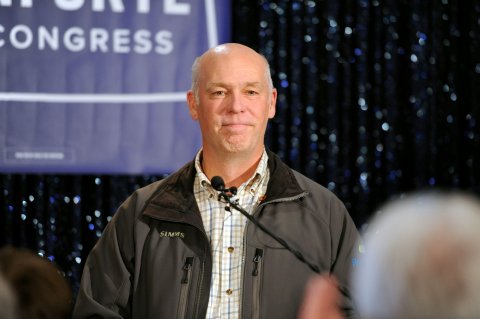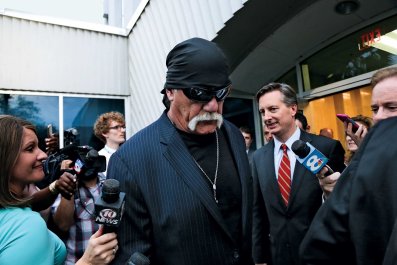Earlier this year, reporter Lee Stranahan was in the White House press room when another journalist asked him which outlet he worked for.
"Breitbart News," Stranahan answered, recalling the exchange in a recent phone conversation.
The other journalist laughed, thinking this had to be a joke. Breitbart, after all, was largely known, whether justly or not, as a hothouse where the alt-right tended to its most outlandish, paranoid creations: Clinton conspiracy theories, anti-immigrant fearmongering, garden-variety misogyny. One of its story tags was "black crime." The tag is no longer used, yet it remains attached to a half-dozen stories on the website, the last published just over a year ago.
Tradition rules journalism as much as it rules golf, and tradition dictated that the White House press room was for upstanding men and women who'd gone to Columbia Journalism School, putting in their time at the Palookaville Weekly Citizen before earning a coveted spot in the newsroom of The Washington Post or The New York Times, or some other publication that deserved to be in the White House because its mission was sober reportage, not click-bait about "lesbian bridezillas" or "trannies." Breitbart had no business being there because it would eagerly publish—has eagerly published, in fact—articles about "lesbian bridezillas" and "trannies."
And not just a couple of such articles either: Breitbart's editorial outlook is not imbued with cultural or political conservatism. Breitbart's guiding principle is that of the tabloid: If it bleeds, it leads. Especially if the bleeding is caused by an illegal immigrant or some "globalist" Democrat crafting the New World Order on her porch in the Hamptons. This was (and largely remains) a lurid vision of America, terrifying yet enchanting, like one of those 1980s crime blockbusters with weird racial politics and lots of explosions, not to mention at least a couple of scantily clad blondes in search of a musclebound savior, preferably one wearing a sweat-stained American flag bandana.
But there Breitbart was, the outsider suddenly in the inner sanctum of American power, the unpopular kid unexpectedly crowned prom king, sought out by all those who'd once mocked him. Its chief executive, unkempt ultra-nationalist Steve Bannon, is now Trump's chief strategist. He brought Breitbart staffers with him to the White House, including self-styled terrorism expert Sebastian Gorka and establishment tormentor Julia Hahn, in what The Hill called "the Breitbartization of the White House."
And even as President Trump was supposedly draining the political swamp, his White House granted Bannon a retroactive ethics waiver that allowed him to keep talking to Breitbart staffers, in seeming violation of federal rules.

Whatever you think of Breitbart's unabashed distaste for Democrats and centrist Republicans, or its famously incendiary headlines—"Birth Control Makes Women Unattractive and Crazy," "Bill Kristol, Republican Spoiler, Renegade Jew"—it is inarguable that the site helped elect Trump, in large part by mercilessly shredding every Republican opposed to his candidacy while touting his immigration plan (i.e., the border wall) and making the darkest possible insinuations about Hillary Clinton and her supposedly corrupt coterie. So there Breitbart News was on November 8, shoulder to shoulder with Trump in the electoral trenches, firing away at the Democratic firewall. It crumbled that night, and the plains of the Midwest lay open for the taking. So did the Oval Office.
And that's the problem Breitbart faces today, a problem similar to the one plaguing the Trump administration: Being an outsider works only when you're on the outside. Breitbart's (potential) troubles have been compounded because it sold Trump to its readers as our guy. Bannon had once wanted that guy to be Alabama's Senator Jeff Sessions, now the U.S. attorney general. Instead, he got an ideology-averse pseudo-mogul, difficult to control but easy to convince. It's hard to know how much of Breitbart's support of Trump was a ploy for clicks, but it certainly presented a convincing portrait of an economic nationalist whose business savvy was matched only by his xenophobia.
The sale was made, but as has been frequently the case with Trump, the buyers have started to suspect they may have been played for fools. Breitbart (and, really, the entire right-wing media establishment) is now faced with a bungling chief executive who has embraced NATO and Goldman Sachs, largely ditched his plan for a border wall with Mexico and, during a speech in Saudi Arabia, didn't utter the words that have been the touchstone of Republican foreign policy: radical Islamic terrorism.
What's to be done about this? Breitbart doesn't have a particularly rich tonal register, its voice reverting most frequently to outrage, derision or disgust. It is incapable of hitting the complex notes of regret, or even of measured concern. If you wanted nuance, you'd probably be a Weekly Standard subscriber.
"They are an outlet that has a very, very large stake in the success of President Trump," explains Ben Shapiro, who left Breitbart during the presidential campaign, after Trump campaign manager Corey Lewandowski roughly grabbed Breitbart reporter Michelle Fields. After the incident, Breitbart sided with the Trump campaign over its reporter's easily verifiable claims. Shapiro, founder of The Daily Wire and host of a popular right-leaning podcast, says that under Bannon, Breitbart had become "Trump's personal Pravda."

For Breitbart, the potential spoils of playing the role of a state propaganda organ are great. The dangers are greater still. In February, Alexa, which ranks the popularity of websites, scored Breitbart as the 29th most visited website in the nation. This was an astonishing achievement for a news organization founded a decade ago in a Los Angeles basement, unknown to most Americans until the Trump candidacy ceased to seem like a political sideshow. Breitbart celebrated the achievement with typical bluster, touting its digital supremacy over both ESPN and PornHub. By the beginning of 2017, Breitbart had more unique visitors than Politico, more total traffic (that is, both visitors and page views combined) than The Washington Post. Breitbart had beaten not just the pornographers but also the journalistic elites who'd scorned it for years.
But much like Trump himself, Breitbart News may have expended too much energy on gloating. Breitbart has fallen to 63rd in Alexa's rankings (its ranking was actually much lower, in the 270s, but after Vanity Fair published that figure, Breitbart complained to Alexa and had its ranking somehow recalibrated). SimilarWeb, a company that uses Google Analytics to analyze web browsing patterns, found that Breitbart had 128 million total visits in November, but that the number has since dropped to 78 million total visits in April. That is still an amazing feat, one that places Breitbart well above most other news organizations. Yet some in the media wonder whether the high watermark of the site's relevance was the election in November.
Right-wing sites like the nascent Heat Street and Tucker Calrson's more established Daily Caller have shown themselves to be more nimble in their coverage, less tied to the White House and more willing to conduct genuine journalism. Traffic numbers aside, those are the sites I visit when I want to understand what the right is thinking.
Web popularity is fleeting, especially so when tethered to the fortunes of one exceedingly volatile, temperamental head of state. Alex Marlow, 31, the site's Berkeley-educated editor-in-chief, has said he won't allow for Stalinist shows of loyalty in his newsroom (the newsroom is mostly digital; writers tend to work from home). "When we feel like the president is not honoring the pledges he made to the public, he's going to get critical coverage," he told NBC's Today in March.
Breitbart's attempts to detach from Trump have been minor. For the most part, the site has either pulled its punches or directed them elsewhere. Much like the president, Breitbart is adept at transferring blame, usually to hapless White House Press Secretary Sean Spicer, to whom almost unimaginable powers of ruin have been ascribed; the modestly more competent chief of staff, Reince Priebus; or the team of "globalists" (an epithet that, to some, has anti-Semitic connotations) who've pulled Trump toward centrist positions that could yet rescue his presidency but alienate his base.
Cry more. https://t.co/X2PkYNzxm6
— Breitbart News (@BreitbartNews) June 12, 2017
"Any attempts to separate themselves from Trump will result in an immediate collapse of their traffic," warns Shapiro, "and will not result in any additional mainstream credibility."
That credibility won't be easy to come by, especially from a Washington press corps predisposed to sneer at Breitbart as an unsophisticated arriviste, one that has consistently put click-getting ahead of truth-telling. In March, the Standing Committee of Correspondents denied Breitbart a congressional press pass. Hadas Gold, a media reporter for Politico, explained at the time that committee members had questions about Breitbart's monetary ties to right-wing activists Robert Mercer and his daughter Rebekah, which the site has generally downplayed. The committee seemed to also frown on the fact that Breitbart's newsroom was a Capitol Hill townhouse, known as "the Breitbart Embassy."
News organizations are funded by all sorts of individuals, some of them perhaps unworthy of the high-minded journalistic enterprises they sponsor. And though I've never been to the Breitbart Embassy, I doubt it's all that different from your average Manhattan newsroom, with its abused coffee machine and even more abused bathrooms. Regardless, the correspondents' committee felt these to be signs of Breitbart's pervasive amateurism. "The whole thing suggests to me that they're just not ready for a credential," a committee member told Politico.
At the same time, Breitbart's much-touted plans to expand into Europe, proof of its newfound relevance, seem to have been more talk than anything else. In February, Politico reported that "difficulties in recruiting journalists, questions about which language to use and a desire to make a high impact on launch have all slowed down efforts to establish French and German editions." In the course of my reporting, I also heard that domestic bureaus weren't nearly as well staffed as Breitbart wanted readers to believe.

Right around the same time, Breitbart cut ties with its most prominent writer, expert provocateur Milo Yiannopoulos —or "MILO," as he is called on the site, like a European soccer deity—after it was revealed that he'd made comments supportive of pedophilia.
After the London Bridge attack at the beginning of this month, Breitbart reporter Katie McHugh made Islamophobic comments on Twitter ("There would be no deadly terror attacks in the U.K. if Muslims didn't live there"). She was promptly fired, in what may have been a sign of how sensitive Breitbart News has become to accusations that it promulgates right-wing extremism. The firing instead exposed it to criticism from those very extremists, some of whom are now calling the site "Cuckbart," using the far right's favorite term (i.e., "cuck," from cuckold) for weak-kneed members of its clan.

The site's gravest problem may be the wholesale flight of advertisers, who have been pressured by anti-Trump forces to disassociate themselves from any outlet friendly to his administration. "Breitbart ads plummet nearly 90 percent in three months as Trump's troubles mount," read the headline of a Digiday story by Lucia Moses that detailed the site's deepening financial woes.
The campaign against Breitbart is being led by a group that identifies itself on Twitter as Sleeping Giants. At the time of this writing, its online spreadsheet of advertisers that no longer buy ads on Breitbart includes 2,178 entries, from German flagship airline Lufthansa to Zeus, a beard grooming company. A visit to the Sleeping Giants feed finds a tweet at the founder of tech company Taboola, which apparently advertises with Breitbart: "Do you love money more than tolerance?"
The Perils of Access Journalism
Perhaps no man has a more complex relationship with Breitbart than Lee Stranahan, one of the most polarizing and unusual figures of the alt-right, which brims with unusual and polarizing figures. He has quit the site twice and been fired once, because of clashes with editors. But having been originally hired by Breitbart News founder Andrew Breitbart, Stranahan sees himself as a Breitbart purist, a "reader's' advocate" who will rescue the organization from its own trolliest impulses, returning it to its original mission, which was to...well, that's actually not entirely clear.

"I take that legacy really seriously," Stranahan tells me while talking about working for Breitbart, whose founder died in 2012, effectively leaving the site in the hands of Bannon, a slovenly, self-styled intellectual with a visceral feel for the kinds of stories that would animate the far right, the stories mainstream conservative publications like the National Review would never publish.
"It's why I kept going back to Breitbart," Stranahan says. (None of the several current Breitbart editors contacted for this story responded to a request for comment. Nor did Breitbart Chief Executive Larry Solov or the company's spokesperson, Chad Wilkinson.)
These days, Stranahan hosts a radio show for the Sputnik news agency, the Kremlin-funded outlet that has been friendly to Trump. He also runs an online journalism school and The Populist, a news outlet. His sensibility remains edgy and outré, tending to be angry and suspicious. Those can be helpful qualities for a reporter, allowing Stranahan to spot big stories the mainstream media may have missed, most notably the Pigford farm loan scandal, which allowed some African-American farmers to collect $50,000 federal compensation payments after falsely claiming discrimination by the federal Farm Service Agency. But those same qualities could be ruinous if you're trying to cozy up to the White House in hopes of getting first-rate access.
Stranahan is also adept at Periscope, the video-based social media platform owned by Twitter. After his latest departure from Breitbart in March, he posted a 23-minute video in which he called himself Breitbart's "crying mom" and "stern dad," saying the site was in need of "tough love." Congressional Republicans were in the midst of their first, and unsuccessful, attempt to bring the American Health Care Act (AHCA) to a vote, in a push led by House Speaker Paul Ryan but supported by Trump. The bill, which would weaken President Barack Obama's Affordable Care Act without abrogating it, was toxically unpopular with the American public, so Breitbart had deemed it Ryancare, thus implicitly absolving Trump of any responsibility.
Ramadan 2017 has claimed 1,000 lives that we know of. Our tally of attacks so far: https://t.co/hcpbVnk56r
— Breitbart News (@BreitbartNews) June 10, 2017
Stranahan, himself a Trump supporter, would have none of it. "Donald Trump has been actively supporting this bill," he said in the Periscope video, arguing that the responsibility for the AHCA ended with the president. Breitbart pretending otherwise would only mean disaster for Breitbart.
"You're making yourself look bad to the outside world. You're pandering to the worst elements of your readership, who will just go along in complete denial, in complete total denial, that Donald Trump might have actually made a mistake," Stranahan said, his voice far closer to pain than bitterness.
"It's a bad move," he warned. "It's bad move journalistically. It's a bad move politically."
Stranahan tells me what the site lacks most is responsible leadership. "You got people running things, in editorial positions, who are 30 years old," he says. The reference is clearly to Marlow, the editor-in-chief.
Stranahan's greater nemesis is Matt Boyle, the 29-year-old White House editor, with whom he reportedly clashed. A Bannon protégé who lacks his mentor's dark intellectual pretensions, Boyle is reportedly disliked by some on the right, including former colleagues at The Daily Caller who are said to have widely mocked him behind his back. Boyle was recently the subject of a mostly unflattering profile in the Washingtonian in which a former editor, Jonathan Strong, happily went on the record to say that Boyle "has two modes: murder and blow job."

Personal rivalries aside, Stranahan's greater point is that access journalism is not real journalism, that playing publicist to the president ultimately does the president little good while squandering long-sought journalistic credibility. Nor can it be said that Breitbart News has capitalized on that access in the way it must have intended. In February, it landed a White House interview with Spicer, which was broadcast on Facebook Live. The reactions were brutal, with The Washington Post, for example, calling it "the most awkward thing ever."
It was a Trumpian predicament, a classic Rodney Dangerfield moment of respect maddeningly withheld at the moment when it was so plainly deserved.
Alt-Right Theater of the Grotesque
"They've had a lot of growing pains," says Will Sommer, a writer for The Hill who publishes a newsletter on conservative outlets, Right Richter. "It's easier, if you're a site like Breitbart, to be in the opposition," especially if your roster was stocked with iconoclasts like Stranahan and Bannon.
So what now?
Now, you have editor-at-large Joel Pollak explaining that when Trump pushed aside the prime minister of Montenegro during the recent NATO summit, he was merely asserting American supremacy. And you have reporter Daniel Flynn defending Montana politician Greg Gianforte, who'd assaulted a journalist, for "the good politics of body slams" Gianforte practiced in Bozeman.

It's hard to say whether this is what Breitbart readers want or what Breitbart is most capable of giving its readers.
It may simply be that Breitbart was never equipped to become the sober, Wall Street Journal -like publication Marlow seemed to promise after helping to elect Trump. The site was started by Breitbart as "a streamlined news portal for information junkies seeking access to every single story produced by the major newswires," as writer Greg Beato described it in a 2009 post for Gawker. Beato pointed to the not-so-secret formula for Breitbart's success: aggregate wire stories in a way that would earn links from the Drudge Report, the traffic behemoth where Andrew Breitbart had once toiled with the site's founder, Matt Drudge. Beyond any motivating ideology, the site has been sustained by Drudge-friendly links that consistently drive web traffic. That is as true today as it was eight years ago: SimilarWeb's analysis shows that 53 percent of all outside referrals to Breitbart come from Drudge. That may seem like a high number, but it actually represents a precipitous drop of 28 percent since March.
After Breitbart's unexpected death, Bannon sharpened the site, turning it into a high-volume theater of the grotesque, the "platform for the alt-right" that most Americans came to know during the presidential campaign. The hiring of figures like Yiannopoulos signaled a more combative stance on cultural issues; Gorka gave the site its strong anti-Muslim edge, while Hahn, a young University of Chicago graduate, came to so closely mirror her boss's vituperative attacks on the Republican Party's centrists that she came to be known as "Bannon's Bannon."
"Bannon built a far-right-wing media sledgehammer, an enforcer of orthodoxy that its fans praised for its swagger and that its critics labeled xenophobic or worse." That was the colorful description offered by The Washington Post as Bannon moved from the Breitbart Embassy to the big white mansion on Pennsylvania Avenue. The audience was—and remains—younger and more sophisticated than that of Fox News yet animated by the same resentments: the Clintons, Mexico, Muslims, Goldman Sachs, Lena Dunham.

Breitbart can't pivot away from right-wing click-bait to sober, deeply reported news any more than Trump can pivot away from paranoid tweets, self-pitying broadsides against the media and weekends at Mar-a-Lago. Trump, at least, has daughter Ivanka to keep him in check, or so they say. With Bannon gone, it's hard to see anyone at the Breitbart Embassy overseeing the kind of radical editorial overhaul that would make Breitbart more like the Journal and less like World Net Daily.
At the same time, the president it helped elect has an approval rating below 40 percent, making the daily job of selling his policies even more difficult. Breitbart remains an ally, though. If it has anxieties about Trump, it isn't quite ready to share them just yet. That's because while Drudge provides the traffic, Bannon provides the access, the interviews and "exclusives" that are the meat of Breitbart's reporting. Anger the president, and the gates to the White House might close. That has made it difficult for Breitbart to honestly ascribe Trump's shortcomings and failures to Trump himself.
"They're failing to grapple with news of the day," says The Hill 's Sommer. "Eventually, your audience starts to get disillusioned."
This is true not only of Breitbart but of an entire right-wing media ecosystem still largely unwilling to call out Trump on the plainly unrealistic promises he made. Sustained illusion thus becomes the best antidote to creeping disillusion. So in the Breitbart world, the jobs have all come back from China, while "the illegals" have all gone back to Mexico. The administrative state will be deconstructed, just as Bannon promised, until there are so few bureaucrats left in Washington they can share a single Uber out of town. NATO, NAFTA, NEA: They are all dead, or dying, cowering in the last dank dungeons of the "deep state."
Stranahan isn't optimistic about the long-term success of this approach for Breitbart. "I would not be surprised if their readership goes down again," he says of the site he once loved but no longer recognizes.
"It sounds douchey," Stranahan tells me, "but I'm always right."


















